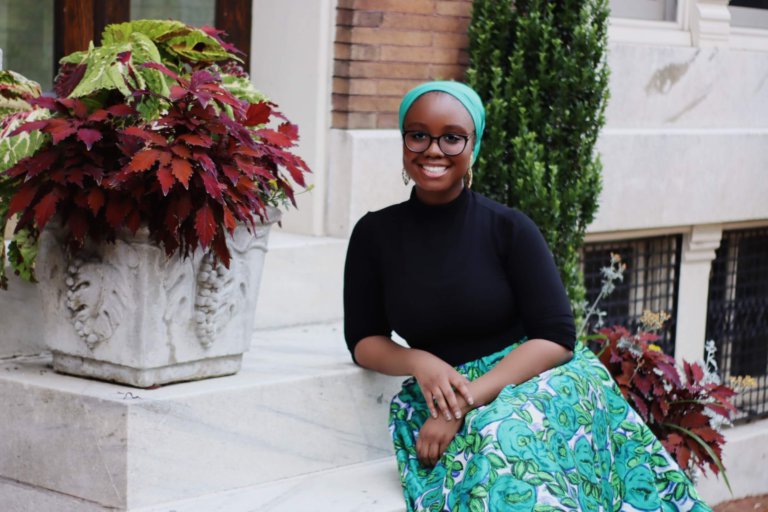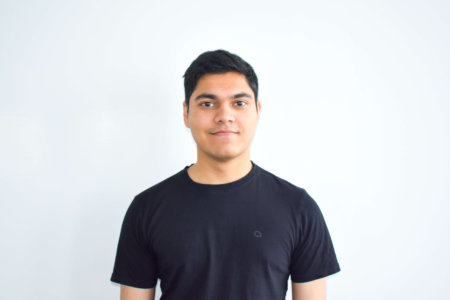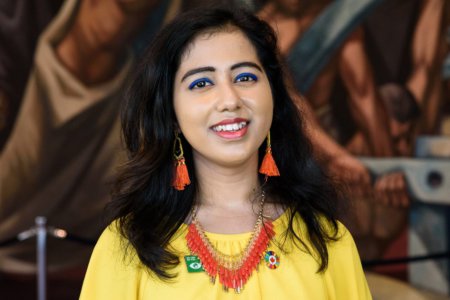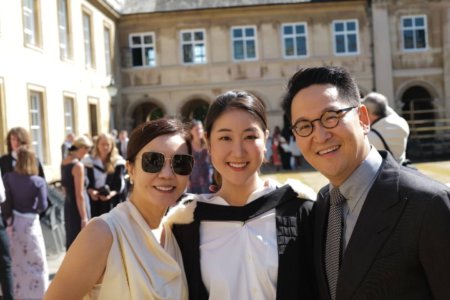
Fareedah Sheed has not only proven that women deserve to lead the tech industry. She’s also the fresh new face of how it can be done with passion and for the greater good. As the CEO and founder of Sekuva, she heads a company that teaches non-tech-savvy people about online security. Her vision is to help one million mothers around the world discover how to protect their kids online. Recently signing a five-figure contract with a multi-billion dollar company, she will provide security training for their employees on how to stay safe at work and at home. For these accomplishments and more, she is listed in this year’s Forbes 30 under 30 list.
It was Shaheed’s childhood in Saudi Arabia that spurred it all. She was bullied for her skin colour and roots as the only black American at school. This inspired her to teach people how to protect their spaces online, just like she had to do in person. We speak to her below about her life in Saudi Arabia and her passion for online security:
What was it like growing up in Saudi Arabia as a black American student? How did you overcome the challenges?
It was really interesting as I had always thought I would fit in immediately because most of the black students were Muslims, at least in the school I was in. It actually didn’t pan out that way though, I had to create my own space making me feel like the odd girl out.
I definitely had some experiences that traumatised me in terms of people not wanting to sit next to me or be around me. All of this happened because of my skin colour and their preconceived notions of who I was.
Despite the hardship, I was able to find a group of people that fought against the notion of discrimination with skin colour and where I was from. These friends were on my side because they understood that everyone is a human being, no matter their colour.
So all these experiences were both dramatic and empowering because there were people who noticed what I went through and gave me their full support. I grew to cultivate some really amazing and beautiful relationships because of that.
Is there a backstory that spurred your passion for online security?
My passion for online security really only started when I started reading the books my father wrote. Having majored in Information Technology, my father recommended it to me. After extensive research, I absolutely fell in love with it because it was a great challenge.
Although not so complex, it really sparked something in me to think about how to protect against attacks. Also helping people protect their money or their children or their business or their network.
I felt that there were more opportunities for me to grow in online security, the stem of my passion for it came when I realised I can help families protect themselves from hackers and predators.
That feeling of waking up in the morning knowing that you have impacted someone’s life by helping them protect their family, really gave me a deep seated satisfaction.

The founding of Sekuva led Fareedah Shaheed to be on 2021’s Forbes 30 under 30 list. Source: Fareedah Shaheed
Aside from Saudi Arabia, where else outside the US have you lived in?
Outside of Saudi Arabia, I lived in Egypt for a couple of months which was beautiful. I adore Egyptian food and believe it’s at the top of my list. I also visited Panama for a month because my grandmother’s side is from there.
Do you think people, especially the younger generation, are well-informed about cybersecurity threats? How does Sekuva address this?
I truly don’t believe that the younger generation are well-informed, but we’re getting to a point where they’re learning a little bit more based on news stories. Through this, they will see the problems with data privacy issues.
From there, people will be more aware that things are happening in terms of security, privacy and safety online. We know about catfishing, impersonation and scams, but we don’t have enough resources that can relate to help protect themselves. Thankfully we have a lot more people coming forward to bridge this gap which is something I’m working on.
In terms of what my business does, I started the Safe Kids movement to help mothers protect their kids online. An online security business that is foundational and breaks the principles down so you don’t have to tech savvy to know about it.
We break down the foundations of online security and safety. This is accomplished by bringing experts to talk about the online safety principles, human trafficking, protecting your kids, creating safe spaces and building confidence with your kids. It’s actually very comprehensive and not just about technology.
In your opinion, to better address online security, how soon should we train our younger generation to understand the basics, given that online learning may just be the future of education?
It’s not just about parental controls and monitoring, but more about a holistic view of the digital world and how to go about it. How do we navigate in this age of technology? How do parents learn how to protect themselves online? By protecting themselves, they protect their kids.
I fully believe that as soon as a child can touch the phone, some type of conversation about control or understanding around technology needs to take place. It shouldn’t be the case of waiting till they’re in first grade or middle school, but immediately as soon as they start interacting with it.
The aim would be to integrate the digital age safely into their lives, and in my opinion, it’s never too early. As previously mentioned, this is for the rest of their lives and not only are you safeguarding them as a kid, you’re making sure they have good resources and tools as they grow up to learn by themselves.
The gender gap spans in most STEM careers where women make up only 20 percent of the global industry. How can women be empowered to take up roles that are traditionally within the “boys club”?
The gender gap can be a really big issue, however, I do think that there are several organisations that are working hard to close that. Not only to include women, but to make sure they’re part of the conversation.
The whole idea not just about women in leading roles, but about retaining them and making them feel like they have space. It’s essential to make sure that in any industry there are more women mentors so the younger generation have a pathway.
By showing women that there different ways to work, and adding flexibility of time and scheduling. The environment of work is another extremely important factor when thinking of a more diverse community in a workspace, there needs to be diverse solutions for that to happen.










